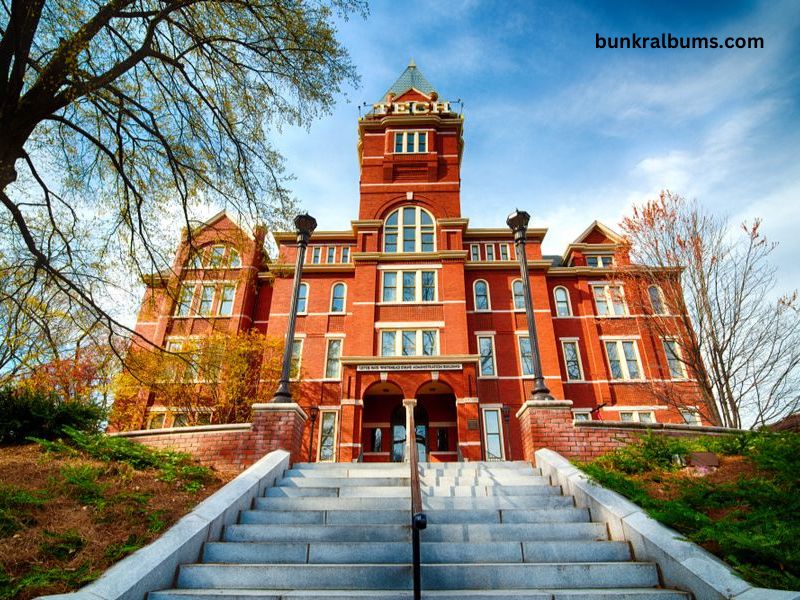The Georgia Institute of Technology, commonly known as Georgia Tech, is one of the leading research universities in the United States. Founded in 1885, Georgia Tech has grown from a small technical school into a globally recognized institution known for its rigorous academic programs, innovative research, and contributions to technology, science, and industry. Located in the heart of Atlanta, Georgia, the university has a vibrant campus that serves as a hub for cutting-edge research and development.
Historical Background
Georgia Tech was established in 1885 as part of the post-Civil War reconstruction efforts in the Southern United States. The institution was initially founded as the Georgia School of Technology, with the aim of helping to industrialize the South by educating a workforce skilled in mechanical engineering and manufacturing. The first classes were held in 1888 with only 84 students and a faculty of six.
Over the years, Georgia Tech expanded its academic offerings and research capabilities. In 1948, the institution was renamed the Georgia Institute of Technology to reflect its broader educational scope beyond just mechanical arts. By the mid-20th century, Georgia Tech had established itself as a leading engineering school, and it began to gain national and international recognition for its research contributions.
Academic Programs
Georgia Tech is renowned for its strong emphasis on engineering and technology, but its academic offerings extend far beyond these fields. The university is organized into six colleges:
- College of Engineering: As one of the largest and most prestigious engineering programs in the country, the College of Engineering at Georgia Tech offers undergraduate and graduate degrees in a wide range of engineering disciplines, including aerospace, biomedical, chemical, civil, computer, electrical, environmental, industrial, materials, and mechanical engineering.
- College of Computing: Georgia Tech’s College of Computing is a leader in computer science education and research. The college offers programs in computer science, computational media, cybersecurity, and artificial intelligence. Georgia Tech’s online Master of Science in Computer Science (OMSCS) program has gained international acclaim for making high-quality education accessible to students around the world.
- Scheller College of Business: The Scheller College of Business combines business education with Georgia Tech’s technological strengths. The college offers undergraduate, MBA, and PhD programs, with a focus on areas such as finance, management, entrepreneurship, and technology commercialization.
- College of Design: The College of Design focuses on the built environment and offers programs in architecture, industrial design, building construction, and city and regional planning. The college emphasizes interdisciplinary approaches to solving complex problems in urban and rural environments.
- College of Sciences: The College of Sciences at Georgia Tech provides a strong foundation in the natural and physical sciences. It offers degrees in biological sciences, chemistry, earth and atmospheric sciences, mathematics, physics, and psychology. The college is also heavily involved in interdisciplinary research in areas such as neuroscience, sustainability, and data science.
- Ivan Allen College of Liberal Arts: The Ivan Allen College of Liberal Arts offers programs in the humanities and social sciences, including history, international affairs, public policy, economics, and literature. The college emphasizes the integration of technology and society, preparing students to address global challenges from a multidisciplinary perspective.
Research and Innovation
Research is at the core of Georgia Tech’s mission, and the university is home to numerous research centers and institutes that drive innovation in various fields. Georgia Tech’s research expenditures exceed $1 billion annually, making it one of the top research universities in the United States.
Some of the key research areas at Georgia Tech include:
- Robotics and Automation: Georgia Tech is a global leader in robotics research, with the Institute for Robotics and Intelligent Machines (IRIM) serving as a hub for interdisciplinary research in robotics, automation, and artificial intelligence. Researchers at IRIM work on projects ranging from autonomous vehicles to advanced prosthetics.
- Cybersecurity: The Georgia Tech Information Security Center (GTISC) is at the forefront of cybersecurity research, focusing on areas such as network security, data privacy, and cyber-physical systems. Georgia Tech’s cybersecurity programs are highly regarded and have produced numerous innovations in the field.
- Sustainable Energy: Georgia Tech is committed to addressing the challenges of sustainable energy through research in renewable energy technologies, energy storage, and energy efficiency. The Strategic Energy Institute (SEI) at Georgia Tech brings together experts from various disciplines to develop solutions for a sustainable energy future.
- Biomedical Engineering: The Wallace H. Coulter Department of Biomedical Engineering, a joint department between Georgia Tech and Emory University, is a leader in biomedical research and education. The department focuses on developing innovative medical technologies, improving healthcare delivery, and advancing the understanding of biological systems.
- Advanced Manufacturing: Georgia Tech is a key player in the field of advanced manufacturing, with research efforts aimed at improving manufacturing processes, materials, and systems. The Georgia Tech Manufacturing Institute (GTMI) collaborates with industry partners to develop cutting-edge manufacturing technologies.
Campus and Facilities
Georgia Tech’s main campus is located in Midtown Atlanta, a vibrant and dynamic area that provides students with access to a wide range of cultural, recreational, and professional opportunities. The campus spans 400 acres and features a mix of historic and modern buildings, state-of-the-art research facilities, and green spaces.
Some of the notable facilities on campus include:
- Clough Undergraduate Learning Commons (CULC): The CULC is a central hub for undergraduate education at Georgia Tech, providing students with collaborative study spaces, classrooms, and laboratories. The building is also home to the Office of Undergraduate Education and the Center for Academic Success.
- Marcus Nanotechnology Building: The Marcus Nanotechnology Building is one of the largest nanotechnology research facilities in the world. It houses cleanrooms, laboratories, and equipment for research in nanotechnology, materials science, and electronics.
- Georgia Tech Library: The Georgia Tech Library is a modern research library that offers a wide range of resources and services to support the academic and research needs of students and faculty. The library has undergone significant renovations in recent years, transforming it into a flexible and technology-rich learning environment.
- Technology Square: Located adjacent to the main campus, Technology Square is a thriving innovation district that brings together academic, industry, and startup communities. The area is home to the Scheller College of Business, the Advanced Technology Development Center (ATDC), and numerous research centers and corporate innovation labs.
Student Life and Extracurricular Activities
Georgia Tech offers a vibrant and diverse student life experience, with numerous opportunities for students to get involved in extracurricular activities, organizations, and events. The university is home to over 400 student organizations, including academic clubs, cultural groups, professional societies, and recreational clubs.
Some of the key aspects of student life at Georgia Tech include:
- Greek Life: Georgia Tech has a strong Greek community, with over 50 fraternities and sororities that offer students opportunities for leadership, community service, and social engagement. Greek life is an integral part of the campus culture, with many students participating in Greek organizations.
- Intramural and Club Sports: Georgia Tech offers a wide range of intramural and club sports for students who want to stay active and compete in a fun and supportive environment. From traditional sports like soccer and basketball to unique activities like ultimate frisbee and rock climbing, there are options for students of all interests and skill levels.
- Arts and Culture: The arts are an important part of campus life at Georgia Tech, with numerous opportunities for students to engage in creative expression. The Ferst Center for the Arts hosts performances in music, theater, dance, and more, while student organizations like the Georgia Tech Glee Club and DramaTech Theatre provide outlets for artistic involvement.
- Service and Leadership: Georgia Tech emphasizes the importance of service and leadership, encouraging students to make a positive impact on their communities. The Office of Leadership and Civic Engagement offers programs and resources to help students develop their leadership skills and engage in community service.
- Innovation and Entrepreneurship: Georgia Tech fosters a culture of innovation and entrepreneurship, with numerous resources available to support student entrepreneurs. The Advanced Technology Development Center (ATDC) is a startup incubator that helps students turn their ideas into viable businesses, while the CREATE-X initiative offers programs in startup development, venture funding, and entrepreneurial education.
Global Impact and Outreach
Georgia Tech’s impact extends far beyond its Atlanta campus, with a strong commitment to global engagement and outreach. The university has established partnerships with institutions and organizations around the world, and it offers numerous opportunities for students to study and conduct research abroad.
Some of the key global initiatives at Georgia Tech include:
- Global Research and Education Collaborations: Georgia Tech collaborates with universities and research institutions around the world on joint research projects, faculty exchanges, and student programs. These collaborations allow Georgia Tech to contribute to global scientific and technological advancements while providing students with international perspectives.
- Study Abroad Programs: Georgia Tech offers a wide range of study abroad programs that allow students to gain global experiences while earning academic credit. Programs are available in countries across Europe, Asia, Latin America, and Africa, with options for short-term, semester-long, and year-long study.
- Georgia Tech-Lorraine: Georgia Tech-Lorraine is the university’s European campus located in Metz, France. Established in 1990, Georgia Tech-Lorraine offers undergraduate and graduate programs in engineering, computer science, and business, providing students with a unique opportunity to study in Europe while earning a Georgia Tech degree.
- International Development: Georgia Tech is involved in international development projects that address critical challenges in areas such as healthcare, energy, and infrastructure. The university’s researchers work with governments, NGOs, and industry partners to develop innovative solutions that have a positive impact on communities around the world.
Conclusion
The Georgia Institute of Technology stands as a beacon of excellence in education, research, and innovation. With its rich history, diverse academic programs.







